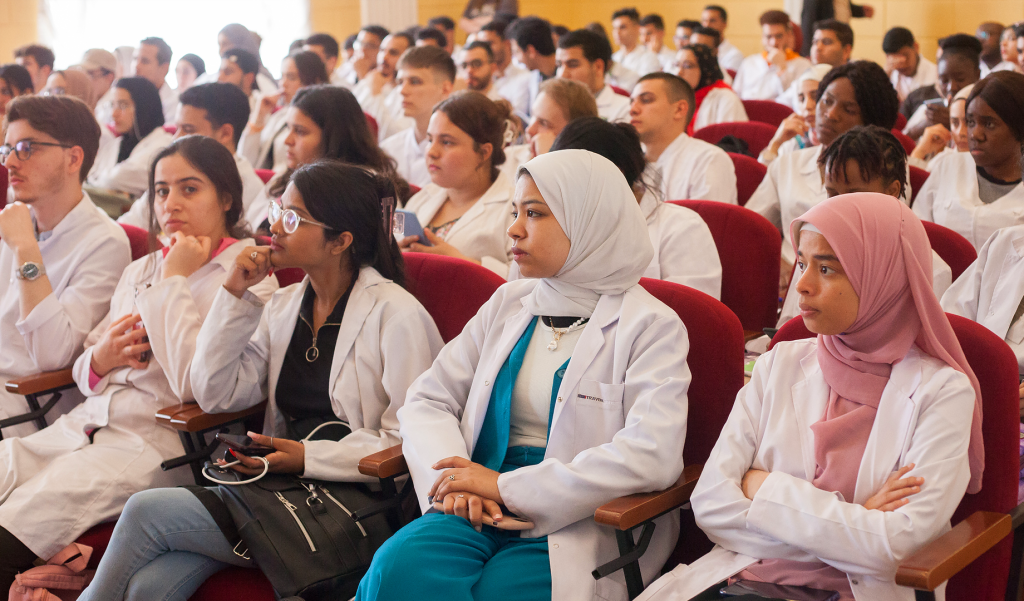Higher education in Russia has a three-tier system which consists of Bachelor's or Specialist’s degree, Master’s degree and postgraduate studies.
For foreign citizens, Russian universities offer pre-university training known as Foundation course.
Foundation course is an educational subdivision of a higher education institution, the purpose of which is to prepare foreign citizens for their further studies on main and postgraduate educational programs in the Russian language.
The duration of study is one academic year (7–10 months). The main purpose of the Foundation course is to learn the Russian language and improve the level of training in core and special disciplines (Chemistry, Biology, Physics, Mathematics, Computer Science, etc.) to continue studying at the university in the chosen program.
Studying at the foundation course is carried out in 4 areas:
Biomedical: Chemistry, Biology;
Engineering: Mathematics, Physics, Computer Science;
Economics: Mathematics, Physics, Computer Science;
Humanities: History, Social Science, Literature, Geography.
The university may include other subjects in the program of the Foundation course at its discretion.
The system of Russian higher education is as follows.
-
Higher Education
Medicine
-
Specialist's Degree
Specialist's Degree is a level of higher education, upon completion of which the qualification Specialist is assigned. At this level, fundamental disciplines, within which students are prepared to work in a particular industry, are studied extensively.
5/6years of study
-
Clinical Residency
Clinical Residency is a PhD program for graduates of medical schools. The main objective of this level is to train specialists for practical work in particular and specific areas of medicine.
2–5years of study
-
PhD
PhD is a level of education, the main purpose of which is the training of scientific and pedagogical staff in a certain academic field.
3years of study
-
Higher Education
Engineering Economics Humanities
-
Bachelor's degree
Bachelor's degree is the first level of basic higher education, which lasts 4 years. It provides an opportunity to acquire fundamental knowledge in the chosen field and to master individual research skills.
4years of study
-
Master's degree
Master's degree is the second level of higher education, which allows you to deepen specialization in a certain professional direction and in some cases, to change it.
2years of study
-
PhD
PhD is a level of education, the main purpose of which is the training of scientific and pedagogical staff in a certain academic field.
3years of study
Academic year in Russia
One academic year lasts 10 months: September 1 – June 30.
The academic year is divided into two semesters. At the end of each semester, students pass their tests and exams in the subjects they studied.
-
1st semester: September 1 – January 25
-
2nd semester: February 9 – June 30
Approximate vacation periods:
-
winter vacation (2 weeks: from January 25 to February 9)
-
summer vacation (2 months: from July 1 to August 31)
Students can spend winter and summer vacations in Russia, or they can visit their homeland.
Studies in English and French language
Classes are given by professors who are fluent in foreign languages; some classes are assisted by an interpreter. Learning the Russian language is compulsory for the students. Communication in Russian takes place between students from all over the world, not only at lectures and seminars, but also outside the university. Young people freely communicate in Russian with native speakers and travel around Russia. Besides, all the traineeships and practical classes in hospitals or companies are in Russian, so it is extremely important for students to understand and speak it well. Apart from that, course of Latin is also included in the curriculum of medical programs as it is the international language of medicine. During the classes, professors widely use Latin terms.

The number of classes taught in Russian will increase with every academic year. For instance, in the first academic years all classes are given in foreign languages, and at the same time students intensively study Russian. In the senior years, some non-major subjects can be taught in Russian — the switch to Russian takes place only after taking the required amount of Russian language classes and when students have sufficient knowledge of it to master the given topic/subject freely.
All tests and exams, as well as final examinations, can be taken by the student in a foreign language or in Russian upon confirmation from the university administration. If necessary, professional interpreters may be additionally involved.
Master’s degree programs are fully taught in the English language. However, Russian is included in the curriculum and Master’s degree students have to learn it.
Cost of studies in Russia
Education of international students at Russian universities is up to 80% subsidized by the Russian Government, which makes studying in Russia affordable. With government subsidizing, an average cost of studies is 1,500–4,000 USD per academic year (depending on the program and language of study).

